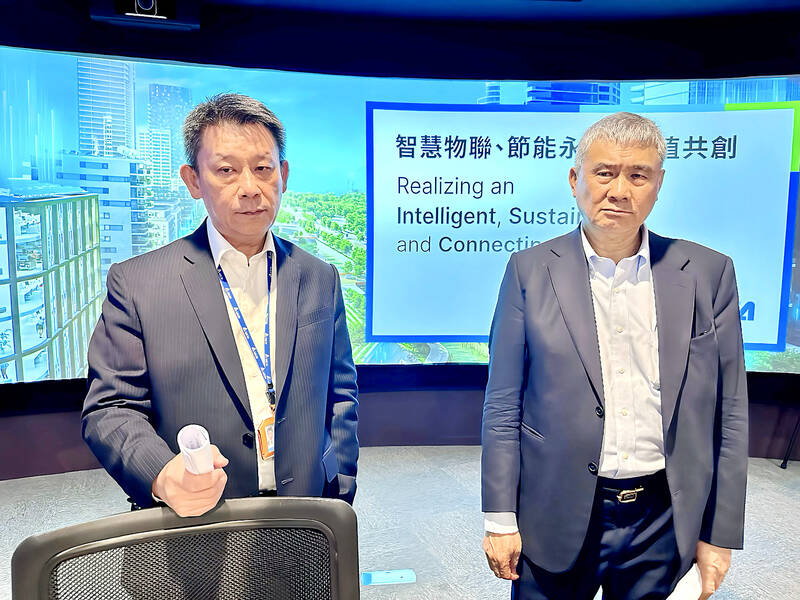Power supply and electronic components maker Delta Electronics Co (台達電) yesterday said that revenue this quarter would be higher than last quarter, partly due to fewer working days.
The company’s operations in the first half of the year are also expected to be better than the same period last year, on the back of rising sales of artificial intelligence (AI) related power supplies and electronic components, continued sales growth in power components for automotive electronics, and improvement in power solutions for automation and infrastructure businesses, it said.
Thanks to the production of heat dissipation parts for AI servers powered by Nvidia Corp’s GB200 chips in the second half of the year, coupled with the rising contribution of AI power supplies to total sales, Delta’s overall operations in the second half of the year would be stronger, it added.

Photo: Fang Wei-chieh, Taipei Times
Delta saw AI power supply revenue account for 4 to 5 percent of its total revenue in the first quarter, compared with 3 percent last year, the Chinese-language Liberty Times (the Taipei Times’ sister newspaper) reported on its Web site yesterday, citing Delta chief executive officer Cheng Ping (鄭平).
The company has made progress in the heat dissipation field for AI servers and plans to begin small volume production of some of the new products in the second half of the year, before starting mass production next year, Cheng said.
Delta products include power systems for information technology, automotive devices, telecommunications, industrial applications and medical items.
The rising adoption of electric vehicles (EVs) — led by the clean energy trend — has boosted Delta’s EV power products in the past few years and is likely to continue to support the firm’s growth momentum in the long term, although the growth is tapering off, Cheng said.
However, the company still maintains the view that the EV market would grow by 20 to 30 percent throughout the year, the Liberty Times reported, citing Delta chairman Yancey Hai (海英俊).
Delta on Tuesday posted its lowest profit last quarter in four years, attributing the weakness to higher operating expenses, which accounted for 21.4 percent of total sales in the quarter, compared with 18.5 percent a year earlier.
Earnings per share in the three-month period to March fell to NT$2.22, down 16.54 percent year-on-year and the lowest since the first quarter of 2020, when the number was NT$0.8, the company said in a report.
First-quarter revenue was NT$91.297 billion (US$2.81 billion), down 1.67 percent year-on-year, below market expectations due to lower shipments of power products for consumer electronics, industrial automation and infrastructure projects, it said.
Gross margin was 29.5 percent in the first quarter, up from 27.5 percent a year earlier, but operating margin fell by 0.95 percentage points to 8.1 percent due to higher research-and-development fees as well as selling and administrative expenses, the company said.

NOT JUSTIFIED: The bank’s governor said there would only be a rate cut if inflation falls below 1.5% and economic conditions deteriorate, which have not been detected The central bank yesterday kept its key interest rates unchanged for a fifth consecutive quarter, aligning with market expectations, while slightly lowering its inflation outlook amid signs of cooling price pressures. The move came after the US Federal Reserve held rates steady overnight, despite pressure from US President Donald Trump to cut borrowing costs. Central bank board members unanimously voted to maintain the discount rate at 2 percent, the secured loan rate at 2.375 percent and the overnight lending rate at 4.25 percent. “We consider the policy decision appropriate, although it suggests tightening leaning after factoring in slackening inflation and stable GDP growth,”

DIVIDED VIEWS: Although the Fed agreed on holding rates steady, some officials see no rate cuts for this year, while 10 policymakers foresee two or more cuts There are a lot of unknowns about the outlook for the economy and interest rates, but US Federal Reserve Chair Jerome Powell signaled at least one thing seems certain: Higher prices are coming. Fed policymakers voted unanimously to hold interest rates steady at a range of 4.25 percent to 4.50 percent for a fourth straight meeting on Wednesday, as they await clarity on whether tariffs would leave a one-time or more lasting mark on inflation. Powell said it is still unclear how much of the bill would fall on the shoulders of consumers, but he expects to learn more about tariffs

Greek tourism student Katerina quit within a month of starting work at a five-star hotel in Halkidiki, one of the country’s top destinations, because she said conditions were so dire. Beyond the bad pay, the 22-year-old said that her working and living conditions were “miserable and unacceptable.” Millions holiday in Greece every year, but its vital tourism industry is finding it harder and harder to recruit Greeks to look after them. “I was asked to work in any department of the hotel where there was a need, from service to cleaning,” said Katerina, a tourism and marketing student, who would

i Gasoline and diesel prices at fuel stations are this week to rise NT$0.1 per liter, as tensions in the Middle East pushed crude oil prices higher last week, CPC Corp, Taiwan (台灣中油) and Formosa Petrochemical Corp (台塑石化) said yesterday. International crude oil prices last week rose for the third consecutive week due to an escalating conflict between Israel and Iran, as the market is concerned that the situation in the Middle East might affect crude oil supply, CPC and Formosa said in separate statements. Front-month Brent crude oil futures — the international oil benchmark — rose 3.75 percent to settle at US$77.01